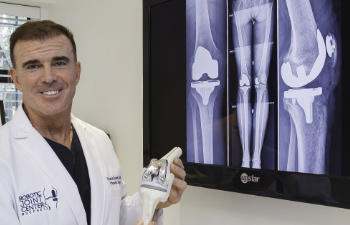
Knee Positioner for Exposure and safety
- Dr. Buechel uses a Specialized Padded leg holder designed to support your leg safely during the partial knee procedure (IMP Leg Holder)
Infection control
- Dr. Buechel wears a Joint Replacement Space Suit with lighted helmet for optimal visualization and protection
- Adhesive Drapes are used to seal skin during surgery
- Antibiotics are in the Bone Cement
- Antibiotics are given to you in your IV
- Preoperative and postoperative Nutritional Supplementation is recommended to optimize your healing and immune system
Muscle avoiding incision
- Dr. Buechel precisely draws the anatomy for optimal incision size and position
- 2-3-inch skin incision is used for most medial partial knee procedures
- Avoiding Muscle allows for faster return to activity during the recovery process
Blood Loss Control
- The medicine Tranexamic Acid is given intravenously to reduce blood lossLocal Anesthetic with Epinephrine is injected into the incisions to reduce bleeding
- Meticulous bleeding control during the exposure minimizes blood loss
- No Tourniquet is needed to control bleeding, which also reduces blood clot risk
- Orthobiologics Application into joint and would closure reduces bleeding
- Proper knee positioning and use of the leg positioner during surgery reduces blood loss.
Anesthesia
- A multimodal approach to your pain control provides an optimal recovery
- Spinal Anesthesia is recommended, General Anesthesia is good if needed.
- Regional pain block #1: I-PACK Block
- Regional pain block #2: Adductor Canal Block
- Periarticular Local Block: Marcaine, Ketorolac, Morphine
Blood Clot Reduction
- No Tourniquet is used which is the biggest reducer of risk
- No instruments in the canals of the bones to cause emboli
- Spinal Anesthesia reduces blood clot risk
- Walking within hours of the surgery reduces clot risk
- Aspirin 81mg once or twice a day for 3-4 weeks
- Efficient surgical process reduces risk
- A compression sports sleeve is used after surgery for 4-6 weeks
Suture Choices
- Micro-barbed sutures
- Avoids knot abscesses
- Antibacterial material lowers infection risk
- Provides a Watertight closure
Skin Adhesives
- Dermabond Skin Adhesive seals the skin edges
- Allows Showering the Day after surgery
- Provides a Barrier to Infection
- Provides better scar appearance
- Removes easily at 3 weeks
Skin Dressings
- Silicone Boarder Dressings are used
- Reduces skin irritation
- Waterproof for showering
- Remain on for 5-7 days
- Anti-bacterial
- Protects the skin glue from clothing rubbing it off
Cold Therapy Wrap / Cooling Devices
- Wear continuously as tolerated after surgery
- Reduces swelling
- Reduces pain
- Reduce medication requirements
- Improve motion
- Commonly used for 4-6 weeks daily to optimize swelling reduction early
Compression Sleeve
- We provide a Reparel Compression Knee Sleeve after surgery
- These Reduce swelling
- Provides comfort/support
- Improves blood flow
- Used for 4-6 weeks to optimize recovery
Medications
- Decadron IV Pre-incision & Post Op given in Operating room (Steroid to reduce inflammation)
- Aspirin 81mg once or twice a day for 3-4 weeks (Reduce Blood Clot risk)(Pain reducer)
- Acetaminophen (Pain and Inflammation reduction post op) as needed
- Ibuprofen (Pain and Inflammation reduction post op) as needed
- Hydrocodone (Moderate pain reduction medication, if needed)
Instruments/Tissue Safety
- Dr. Buechel is very gentle with tissue handling to minimize tissue harm and optimize wound healing.
- Dr. Buechel’s custom partial & total knee instrument sets have tools designed specifically for these procedures and are used to minimize tissue harm and optimize efficiency.
- Dr. Buechel uses the precision robotic-arm assisted knee installation system by Stryker called “Mako Partial Knee” and “Mako Total Knee”.
- Dr. Buechel is an expert user of, and Stryker certified international instructor for the Robotic Mako Knee and Hip Replacement Systems.
Physical Therapy
- We provide a comprehensive post op therapy program for home and your therapist
- Gentle therapy starts the day of surgery
- Physical Therapy is a guide that is designed to eventually return you to a regular exercise program on your own
Nutritional Support
- Protein Supplementation is recommended to enhance wound healing
- Vitamin C: (to enhance wound healing and infection reduction)
- Probiotics: (to support your microbiome to optimize healing and to minimize the negative the effects of the antibiotics on your GI Tract)
Posted on behalf of
New York, NY 10021
Phone: (212) 308-3089
FAX: (646) 844-1396
Email: Info@RoboticJointCenter.com
Mon – Fri: 9 AM – 6 PM